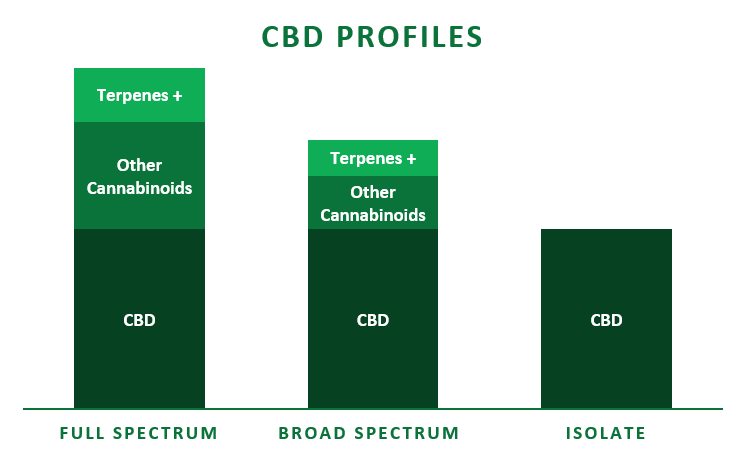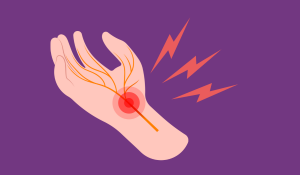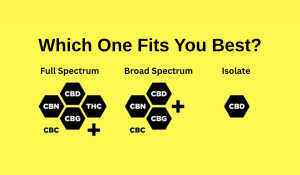Full spectrum CBD oil contains all the components of a whole cannabis plant, including CBD, terpenes, CBN, CBG, flavonoids, and trace amounts of THC. This creates what is known as the entourage effect. On the other hand, broad spectrum CBD oil is similar to full spectrum CBD oil but does not contain any THC. CBD isolate, in contrast, is pure CBD with all other parts of the plant removed.
CBD provides a variety of benefits, from minimizing chronic pain to reducing anxiety. However, not all types of CBD are created equal or intended to help with the same conditions. When shopping for the right CBD product, it’s crucial to understand the difference between full spectrum CBD oil and broad spectrum CBD oil, as well as CBD isolate, to make an informed decision.

Full spectrum CBD oil is the most popular type and contains all the components of a whole cannabis plant, which includes:
Because full spectrum CBD oil contains both terpenes and cannabinoids, it creates an “entourage effect.” This means the components produce a stronger influence together than they would separately.
Broad spectrum CBD oil, like full spectrum CBD oil, contains terpenes and cannabinoids but lacks THC. Broad spectrum products still produce an “entourage effect” but do not have the psychoactive effects of THC. Manufacturers create broad spectrum CBD oil by isolating and removing THC while preserving the other beneficial compounds.
CBD isolate is the purest form of CBD, with all other components of the cannabis plant removed, including THC, oils, chlorophyll, terpenes, and waxes. This results in a product that is purely CBD. Although a small percentage of THC may be present depending on the purity, CBD isolate is a good option for those seeking the purest form of CBD.
When deciding which type of CBD product is right for you, consider the following:

Explore this cbd consumption methods tutorial and follow the step-by-step process to select, use, and verify the safest ways to consume CBD for wellness.
Read More
Learn what CBD edibles are, their main types, expected effects, legal status, safety factors, and how they compare to other forms of CBD.
Read More
Therapeutic Uses of CBD Managing Chronic Pain with CBD Struggling with chronic pain? CBD might help. Studies suggest it can reduce inflammation and alleviate discomfort,...
Read More
Just as CBD may help humans due to its interaction with the body’s endocannabinoid system, the same is true of dogs. CBD has the potential...
Read More
Cannabis has been used for millennia to treat numerous health conditions. Current research offers promising results on the effects of CBD oil on breast cancer.
Read More
What Is CBD for Cats? CBD (Cannabidiol) is a natural compound from hemp. It’s non-psychoactive, meaning your cat won’t get “high.” Instead, it works with...
Read More
1. Understanding Neuropathic Pain Neuropathic pain results from nerve damage or dysfunction, causing symptoms like burning, tingling, or sharp shooting pains. Common Causes: Symptoms Include:...
Read More
CBD for Pets: A Pet Parent’s Guide to Dosage We all want the best for our pets, especially when they’re struggling with pain, anxiety, or...
Read More
What Is Lupus? Lupus is a long-term autoimmune condition that can impact multiple organs, including the skin, heart, lungs, and kidneys. The most common type...
Read More
1. Full-Spectrum CBD: The All-In-One Option What it is: Contains CBD, minor cannabinoids, terpenes, flavonoids — and less than 0.3% THC. Why choose it: Promotes...
Read More